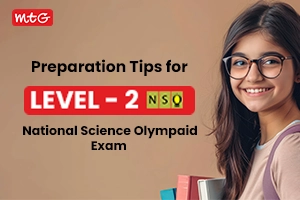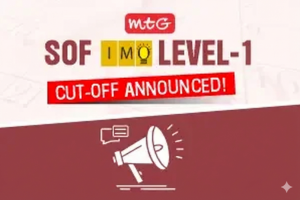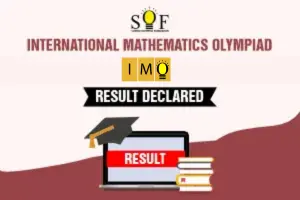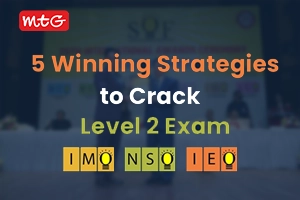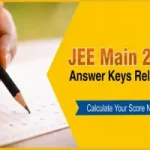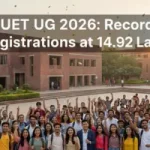Every student learns uniquely, and the thing that makes everyone’s learning experience unique is their approach. SOF Olympiad is about the approach of applying knowledge, thinking critically, and solving problems with confidence. For students, participating in Olympiads can be a powerful way to develop these skills early. Academic competitions like SOF Olympiads may seem focused on rankings and results, but the truth is that value lies in the learning outcomes from participating in Olympiads.
Many parents and educators ask if preparing for Olympiads is worth the extra effort. Will it help my child grow, or just add more pressure?
These are important questions, especially in an age where the balance between academics and overall development matters more than ever. In this article, we explore how Olympiads, when approached the right way, can encourage deeper understanding, build confidence, and develop essential thinking skills. We’ll also look at some common challenges students face, and how the right guidance and resources can turn these challenges into opportunities for genuine growth. For deeper insights, explore why educators value these exams in Why Every Student Should Try SOF Olympiads: Insights from Teachers
What SOF Olympiads Truly Offer: Beyond Scores and Ranks
While Olympiads are often viewed as academic contests, their real impact lies in how they shape a student’s thinking and approach to learning. Let’s explore the key learning outcomes students gain through Olympiad participation:
Strengthening Conceptual Understanding
SOF Olympiad questions are designed to test clarity of concepts, not just memorisation. Whether it’s Mathematics, Science, English, or Reasoning, students must truly understand the how and why behind every topic.
This leads to:
- A deeper grasp of academic fundamentals
- The ability to apply concepts in new, unfamiliar scenarios
- Better retention and long-term understanding
Building Critical Thinking and Analytical Skills
Olympiad questions often go a step beyond standard textbooks. They require analysis, evaluation, and decision-making.
As a result, students learn to:
- Break down complex problems into manageable steps
- Evaluate different solutions before choosing the best one
- Approach learning with curiosity and logic
Enhancing Time Management and Exam Temperament
Timed Olympiad exams teach students how to manage pressure and focus their energy effectively, an essential skill in today’s fast-paced academic environment.
Key takeaways include:
- Better time management strategies
- Increased confidence under exam conditions
- Improved performance in school exams and entrance tests later on
Cultivating a Growth Mindset
Not every Olympiad attempt leads to a medal, and that’s perfectly fine. What matters is the learning gained through the process.
Students gradually learn to:
- Embrace challenges
- View mistakes as learning opportunities
- Set personal learning goals rather than just competing for rank
These themes are echoed in our 7 Must Know Benefits of Olympiads
Common Challenges Faced by Students and How to Address Them
SOF Olympiad preparation does bring its own set of challenges, especially when not approached with the right mindset. Here’s how parents, teachers, and students can manage these hurdles effectively.
- Overemphasis on Results
When students are pressured to achieve top ranks, they may lose interest in the learning process itself.
Solution:
Shift the focus from outcomes to improvement. Encourage students to reflect on what they learned, even if they didn’t get the answer right.
- Lack of Proper Resources
Many students struggle because they rely on generic materials that don’t align with the Olympiad format or syllabus.
Solution:
Use structured, Olympiad-specific resources tailored to the child’s class level. Trusted resources like MTG’s Olympiad books and online tools offer well-researched content mapped to actual Olympiad patterns.
- Difficulty Balancing Olympiad Prep with Schoolwork
Some students feel overwhelmed juggling both.
Solution:
- Integrate Olympiad practice with school learning
- Start with 15–20 minutes a day
- Use weekends or holidays for mock tests and reviews
By managing expectations and choosing the right strategy, Olympiads can be a positive, stress-free learning experience.
Get guidance from Balancing School Exams and SOF Olympiads: A Smart Strategy for Academic Success
Real-Life Learning Outcomes from Olympiad Participation
Let’s take a few examples across different age groups to see how Olympiads foster learning:
Primary Grades (Class 1–5)
A class 2 student, learning addition and subtraction in school, encounters Olympiad questions that frame problems as real-life situations to encourage child to visualise and apply math practically, improving both understanding and confidence.
Middle Grades (Class 6–8)
Students face more advanced questions involving patterns, logical reasoning, and science applications. A Student working on an NSO paper learns to connect textbook science with real-world examples, like how friction works in sports or how magnets interact.
Senior Grades (Class 9–12)
For higher classes, Olympiads demand a deeper application of core subjects. A student preparing for a SOF National Science Olympiad develops analytical skills that directly support entrance exam readiness and build academic maturity.
How to Prepare the Right Way: Focus on Learning, Not Just Competition
To make Olympiad participation a fulfilling and enriching experience, here are a few practical strategies for students and parents:
Start with a Purpose
- Identify the goal: improving problem-solving, building exam confidence, or exploring interests beyond school
- Choose Olympiads that align with your child’s interest areas and current capabilities
Use Reliable, Age-Appropriate Material
- For young learners, start with simple workbooks and puzzle-based formats
- For older students, use structured Olympiad guides, past papers, and mock tests
- MTG offers a complete range from Class 1 to 12, covering all SOF Olympiads with explanations and detailed solutions.
Practice Regularly, but in Moderation
- Set aside 3 to 4 short sessions per week
- Mix topics to keep things fresh
- Celebrate small improvements and encourage curiosity
Reflect and Review
- After each test or practice session, discuss what went well and what was challenging.
- Encourage students to track their progress, not just scores, but strategies and confidence too.
How MTG’s Resources Support Learning-Focused Olympiad Prep
MTG is the only academic partner of the SOF Olympiad, known for supporting students through quality study materials for the SOF Olympiads. MTG Olympiad books, available on MTG.in, are designed to align with the level and learning needs of each class.
Here’s what makes them effective:
- Concept-building explanations, not just answers
- Topic-wise and chapter-wise questions for focused learning
- Mock tests and previous years’ papers to build confidence gradually
- Mapped to the latest SOF Olympiad syllabus for every subject and class
- Level-2 Prep Support: Explore strategies in How to Prepare for SOF Level 2 Olympiads the Right Way.
Explore more about their offerings—such as Olympiad Online Classes tailored for IMO, NSO, IEO, and logical reasoning—on the Online Classes page
Also Check – Olympiad Online Classes (2025-26) by MTG – Benefits | Preparation Tips
Additional Useful Reads
-
Section-wise IEO Tips: Improve vocabulary in SOF IEO Section-wise Tips: Grammar, Vocabulary.
-
Success Stories: Be inspired by our SOF Level 2 Olympiad Success Stories and how Live Online Classes helped achievers
Conclusion
Olympiads encourage students to think deeply, act confidently, and stay curious. When approached with the right mindset, the learning outcomes from Olympiad participation can benefit students well beyond the exam hall.
From better problem-solving to stronger time management, from resilience in facing challenges to genuine academic interest, Olympiads shape future-ready learners. And with the right support or quality resources like those from MTG, students can enjoy this journey while growing every step of the way. This year, give your best in SOF Olympiads with MTG books.
You will also like – Tips to Excel in the SOF Olympiads: What Teachers and Toppers Suggest



